Featured
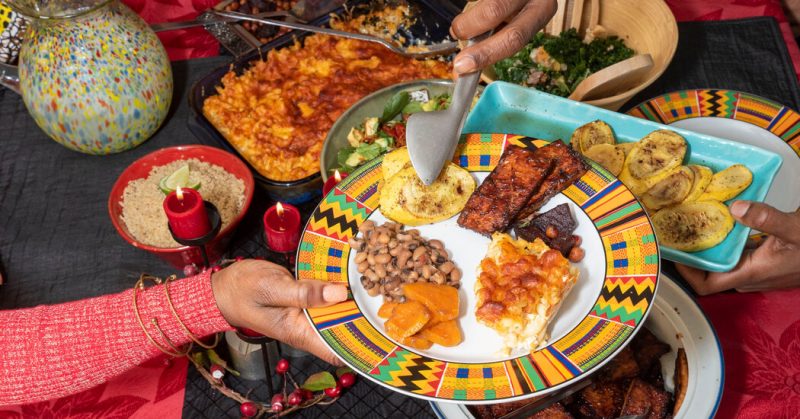 Five Kwanzaa Celebrations Around the Country. By Nicole Taylor / NYT
Five Kwanzaa Celebrations Around the Country. By Nicole Taylor / NYT
For many Black Americans, the holiday is a time for bonding, joy and repose. The Times visited five households to see how people cook and gather, engage and reflect. Kwanzaa, which starts on Dec. 26, was founded in 1966 by Maulana Karenga, then a leader of a community organization in Los Angeles called Us, and modeled after the harvest or “first fruits” celebrations in ancient Egypt, West Africa’s New Yam Festival and other celebrations on the African continent. Read more
Political / Social
 Finding the Light in 2020. By William C. Rhoden / The Undefeated Video
Finding the Light in 2020. By William C. Rhoden / The Undefeated Video
2020 has been a year to remember. From the social justice impact on sports and how out of all of this pain, many Black athletes and Americans found their voice. We review this year’s many lessons, wake up calls, and wins for the culture. Watch here
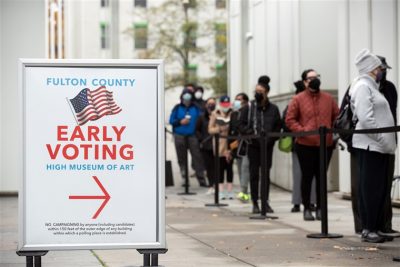 Early voting in Georgia’s Senate runoffs is massive — but what does that mean? By Ella Nisen / Vox
Early voting in Georgia’s Senate runoffs is massive — but what does that mean? By Ella Nisen / Vox
More than 1.4 million people have already voted ahead of Georgia’s two January 5 US Senate runoff elections, a sign that enthusiasm has not slowed down since the presidential election. In addition, even though Black voters undoubtedly make up the majority of Georgia’s Democratic base, the 2020 election showed a successful coalition is also built on Asian American and Pacific Islander (AAPI) voters, Latino voters, and white suburban women. Read more
 Trump’s loss was radicalizing: His promise to “cheat” the system has further deluded his fans. By Amanda Marcotte / Salon
Trump’s loss was radicalizing: His promise to “cheat” the system has further deluded his fans. By Amanda Marcotte / Salon
For years, many liberals have been confused by why so many Donald Trump voters seem unperturbed by all his criming and cheating. To understand Trump’s supporters, it’s important to understand that they don’t believe he’s a good person. On the contrary, the appeal of Trump from the beginning was a belief that he’s a liar, a cheat, and a crook — but one who would implement his evil-doing skills towards goals Republican voters support, with triggering the liberals and snagging all the government goodies for their tribe at the expense of other Americans at the top of the list. Read more
Related: Trump is an authoritarian wannabe. He must never hold power again. By Michael Gerson / Wash Post
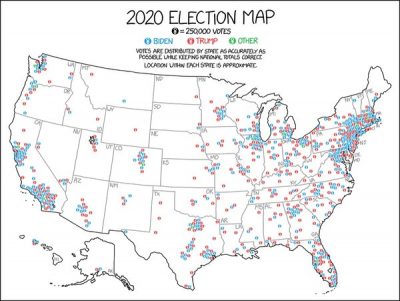 What a new map tells us about the election. By Jamelle Bouie / NYT
What a new map tells us about the election. By Jamelle Bouie / NYT
The goal of the map, Munroe says, is to show where voters are. “My map isn’t great for telling at a glance who won a given state,” he explained on Twitter, but it will help answer a “basic question like ‘Where do most Trump voters in Illinois live?’”First of all, it illustrates the basic truth that few people live in the interior of the country, something even the most detailed red/blue maps tend to obscure. Second of all, Munroe’s illustration of the results shows how talk of secession — of “red states” and “blue states” going their separate ways — is deeply misguided. Every state, every city, every county, every community has Trump voters and Biden voters. Read more
 Pastor, Can White Evangelicalism Be Saved? A conversation about Christmas and faith’s role in building a “beloved community.” By Nicholas Kristof / NYT
Pastor, Can White Evangelicalism Be Saved? A conversation about Christmas and faith’s role in building a “beloved community.” By Nicholas Kristof / NYT
Welcome to the latest in my occasional series of conversations about Christianity. Here’s my interview with the Rev. Jim Wallis, an evangelical Christian pastor, author and justice activist. Read more
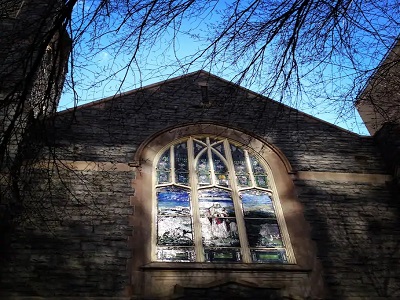 D.C.’s Black churches will remain a ‘beacon of light.’ By Toella Pliakas / Wash Post
D.C.’s Black churches will remain a ‘beacon of light.’ By Toella Pliakas / Wash Post
Targeting Black churches seemed to be a pointed decision. The importance of Black churches in the struggle for Black liberation is profound. Thus they are prime targets for inciting fear in Black communities. Chris Myers Asch, a professor of history at Colby College and the author of “Chocolate City: A History of Race and Democracy in the Nation’s Capital,” said that historically Black churches “are a place where Black people can make their grievances heard, both to the city and, because it’s D.C., to the nation. They are important sites for community-building and political organizing in black communities throughout our country.” Read more
Related: The Conservative War Against the Black Church. By Audrey Farley / The Nation
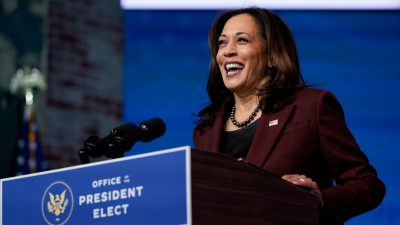 Indian Americans Take Pride In Kamala, But Democrats Must Not Take Them For Granted. By Marina Fang / HuffPost
Indian Americans Take Pride In Kamala, But Democrats Must Not Take Them For Granted. By Marina Fang / HuffPost
Her historic candidacy helped galvanize Asian American voters, a group often ignored by politicians and political parties and organizations, to turn out for her and President-elect Joe Biden in record numbers. Indian Americans, the second largest Asian American subgroup in the country, tend to vote overwhelmingly Democratic, and having a fellow Indian American on the ticket was significant and meaningful. Read more
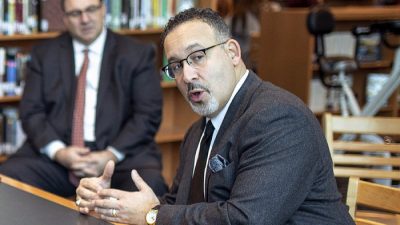 Biden To Name Miguel Cardona As Education Secretary. By Elissa Nadworny / NPR
Biden To Name Miguel Cardona As Education Secretary. By Elissa Nadworny / NPR
President-elect Joe Biden plans to nominate Miguel Cardona, the head of Connecticut’s public schools, to be his secretary of education. In a statement Tuesday evening, Biden called Cardona a “lifelong champion of public education.”Cardona makes true on an early Biden promise to pick an education secretary who was a teacher: “A teacher. Promise,” Biden told the National Education Association, the nation’s largest teachers union, back in July 2019. Read more
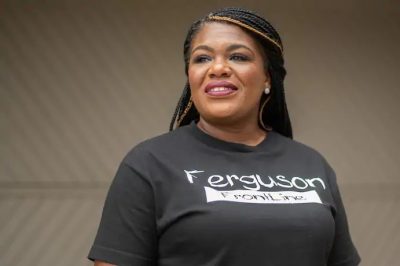 Cori Bush marched on the streets in Ferguson. Now she’s about to take her seat in Congress. By Jada Yuan / Wash Post
Cori Bush marched on the streets in Ferguson. Now she’s about to take her seat in Congress. By Jada Yuan / Wash Post
Bush, 44, got sick of asking public officials to make sweeping changes, particularly regarding criminal justice. So she ran for Congress, winning on her third try. On Jan. 3, she will be sworn in at the Capitol — not just as the first Black woman to represent Missouri in her state’s 200-year history, but also as the first day-in-and-day-out BLM protester to earn a seat in those hallowed halls. Last week, she was appointed to the powerful House Judiciary Committee, which she had been lobbying for ever since winning her primary. Read more
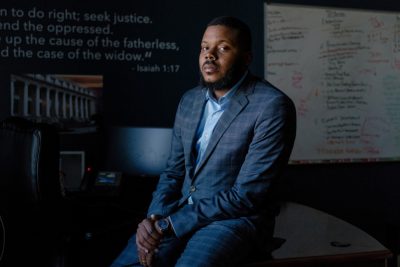 The Fall of Michael Tubbs. By David Siders / Politico
The Fall of Michael Tubbs. By David Siders / Politico
As Mayor of Stockton, Tubbs piloted an experiment in fighting poverty by paying citizens a fixed amount of money each month. He drew attention from progressive Democrats, from tech CEOs, from Oprah. For young Democrats, Tubbs had served as a model of how quickly an ambitious and charismatic candidate, even with little political experience, could gain power in a major American city, and use that seat to advance progressive causes across the country. His defeat served as a reminder of how fragile that route to progress can be. Read more
 50,000 Black Americans Have Died of COVID-19. By Patrick Peck / The Atlantic
50,000 Black Americans Have Died of COVID-19. By Patrick Peck / The Atlantic
Everyone in the U.S. is at the mercy of the coronavirus; it doesn’t discriminate by race or class or gender or age. And yet, from the very beginning of the pandemic, the virus has exposed and targeted all of the disparities that come along with being Black in America. We are dying at 1.7 times the rate of white people from this virus, which means that the toll of these disparities has never been easier to quantify: 19,000 Black people would still be alive if not for systemic racism. Read more
 Air Force report finds Black service members more often investigated, punished. By Lolita C. Baldor / Associated Press and PBS
Air Force report finds Black service members more often investigated, punished. By Lolita C. Baldor / Associated Press and PBS
Black service members in the Air Force are far more likely to be investigated, arrested, face disciplinary actions and be discharged for misconduct, according to a new report that looked at racial disparities across the service. The report by the Air Force inspector general, released Monday, said Black members of the Air Force and Space Force are less likely to be promoted to higher enlisted and officer ranks, and one-third of them believe they don’t get the same opportunities as their white peers. And it concluded that “racial disparity exists” for Black service members, but that the data did not explain why it happens. Read more
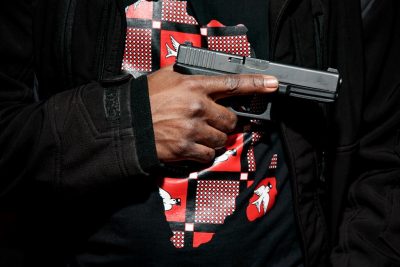 Black and Armed. The surge in Black gun-buying is a response to America’s failing to create a society where all citizens feel safe. By Charles M. Blow / NYT
Black and Armed. The surge in Black gun-buying is a response to America’s failing to create a society where all citizens feel safe. By Charles M. Blow / NYT
Growing up in rural northern Louisiana, everyone I knew, at least every household, seemed to have guns. Men had guns racked in the back windows of their pickup trucks, and pistols under their seats. Women, like my mother, tucked smaller handguns into their purses. I, like many, were convinced that fewer guns in the Black community would make it safer. But, for many Black people, that sentiment has turned. Read more
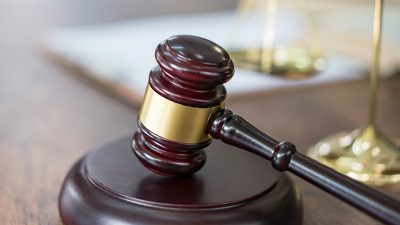
Virginia Judge Won’t Try Black Man In Courtroom With White Portraits. By Matthew Barakat / HuffPost
A Black defendant’s right to a fair trial would be harmed if the jury heard the case in a courtroom lined with portraits of white jurists, a northern Virginia judge has ruled. The upcoming trial of Terrance Shipp on charges of eluding police will be held in a courtroom that has no portraits on the wall, said Fairfax County Circuit Court Judge David Bernhard. Bernhard noted that his usual courtroom has no portraits. But jury trials that were postponed during the coronavirus pandemics are now being held in larger courtrooms. The walls of those rooms are lined with portraits of retired judges who are overwhelmingly white, he said. Read more
Historical / Cultural
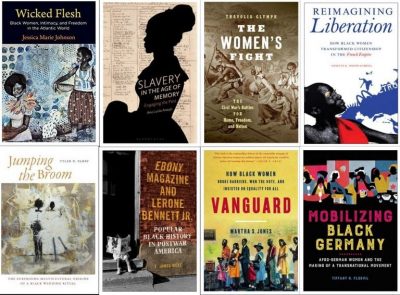 The Best Black History Books of 2020. By AAIHS Editors
The Best Black History Books of 2020. By AAIHS Editors
We asked editors and bloggers of Black Perspectives to select the best books published in 2020 on Black History, and they delivered! Check out this extraordinary list of great books from 2020 that offer varied historical perspectives on the Black experience in the United States and across the globe. From books on slavery in the Atlantic and Tacky’s Revolt to works on marriage, Malcolm X, Afro-German women, Ebony Magazine, and Hollywood, the diverse selections included in this list will enhance your reading list for the new year, and deepen your understanding of Black people’s ideas and experiences in every part of the globe. Read more
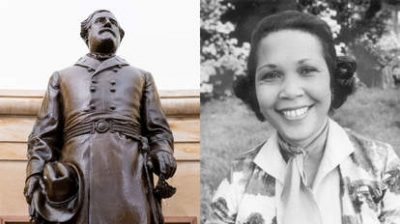 Barbara Johns’ statue will replace that of Robert E. Lee in the US Capitol. By leah Asmelash / CNN
Barbara Johns’ statue will replace that of Robert E. Lee in the US Capitol. By leah Asmelash / CNN
When Barbara Johns was just 16 years old, she led a walkout at her high school to protest poor and unequal school conditions. The moment is one that many historians believe helped launch the desegregation movement in the US. Now, Johns — who died in 1991 — will be memorialized at the US Capitol, replacing Virginia’s statue of Confederate Gen. Robert E. Lee. By law, all states are allowed to donate two statues to the US Capitol for display around the building as part of the National Statuary Hall Collection, and they’re able to replace existing statues through a process that involves the state’s legislature and governor. The removal of the statue of Lee — one of several statues around the Capitol depicting Confederate soldiers and officials — is part of a larger trend of relegating symbols of the Confederacy, due to their racist nature. Read more
 The Kansas City Star’ Apologizes For Past Racist Coverage. Wants Others To ‘Get The Poison Out.’ By Brakkton Booker / NPR
The Kansas City Star’ Apologizes For Past Racist Coverage. Wants Others To ‘Get The Poison Out.’ By Brakkton Booker / NPR
One of the most prestigious newspapers in the midwestern United States issued an apology for what it called “both action and inaction in shaping and misshaping” the history of Missouri’s most populous city and its surrounding region. In a post titled, “The truth in Black and white: An apology from The Kansas City Star,” the paper acknowledged its historic role in shaping attitudes in and around the city. The paper also noted it “disenfranchised, ignored and scored generations of Black Kansas Citizens” for much of its 140 years of existence. Read more
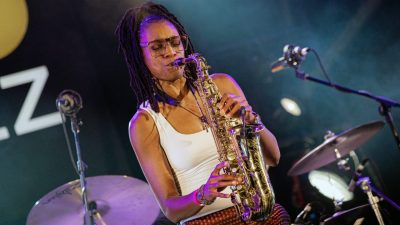 Jazz musicians see signs of hope despite repeated questions about its popularity. By Jerry Bembry / The Undefeated
Jazz musicians see signs of hope despite repeated questions about its popularity. By Jerry Bembry / The Undefeated
Jazz is alive and well enough to be a main story line in Pixar’s new animated movie, Soul, which will be released on Christmas Day and stars Jamie Foxx in the role of a jazz music teacher. Like La La Land in 2016, it has the potential to introduce the music to new audiences. But is jazz still cool? It’s not a new question, of course. Nicholas Payton, a trumpeter and 1997 Grammy Award winner, caused a stir in the industry with a 2011 blog post titled On Why Jazz Isn’t Cool Anymore. Shown is Lakecia Benjamin & Soul Squad who perform during the Mastercard Jazz 2019 Concert on Sept. 1, 2019, in Sao Paulo. Read more
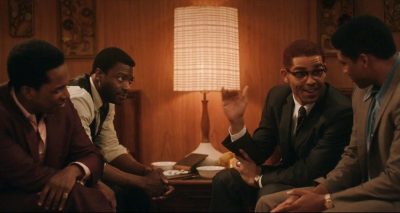 Regina King makes an engrossing directorial debut with a film about the meeting of four Black legends. By Ann Hornaday / Wash Post
Regina King makes an engrossing directorial debut with a film about the meeting of four Black legends. By Ann Hornaday / Wash Post
Regina King makes an assured feature directing debut with “One Night in Miami,” an engrossing adaptation of Kemp Powers’s 2013 stage play. In that well-received drama, Powers wrote about what might have happened on Feb. 25, 1964, when a cocky young boxer named Cassius Clay beat Sonny Liston for the world heavyweight championship; later that night Clay, Nation of Islam leader Malcolm X, pop singer Sam Cooke and NFL star Jim Brown gathered in a hotel room to celebrate. No one knows for sure what they talked about, but Powers concocted a riveting piece of historically grounded speculation, in which the four men debate Clay’s decision to become a Muslim, the political advantages of assimilation versus revolution, the responsibilities of Black men to their communities, and why vanilla ice cream is no match for a flask full of whiskey. Read more
Sports
 D.C. United’s new head of business operations will be first Black president of an MLS team. By Steven Goff / Wash Post
D.C. United’s new head of business operations will be first Black president of an MLS team. By Steven Goff / Wash Post
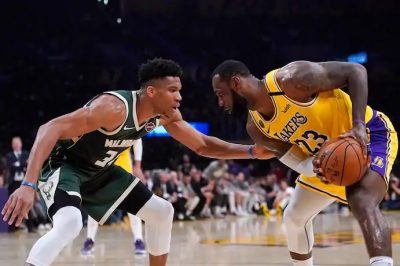 The LeBron James era is winding down. This time, the NBA has a strong transition game. By Jerry Brewer / Wash Post
The LeBron James era is winding down. This time, the NBA has a strong transition game. By Jerry Brewer / Wash Post Tiger Woods Saw ‘Incredible Golf Shots’: His Son’s. By Karen Crouse / NYT
Tiger Woods Saw ‘Incredible Golf Shots’: His Son’s. By Karen Crouse / NYT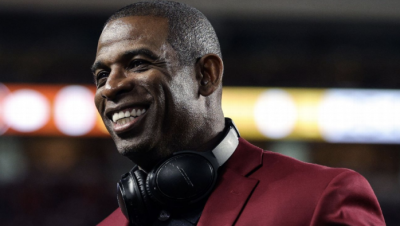 Deion Sanders and Jackson State have HBCUs’ best football recruiting class. By Ashton Edmunds and Marissa Stubbs / The Undefeated
Deion Sanders and Jackson State have HBCUs’ best football recruiting class. By Ashton Edmunds and Marissa Stubbs / The Undefeated